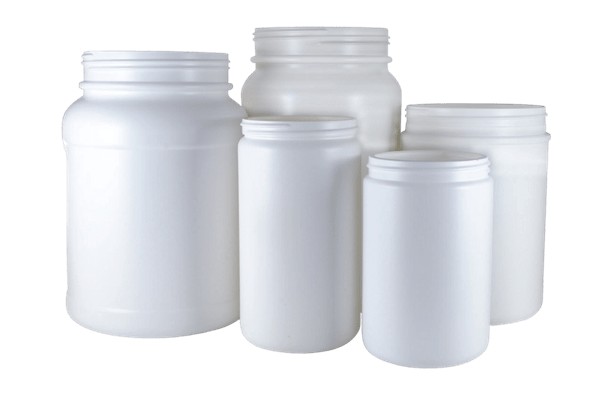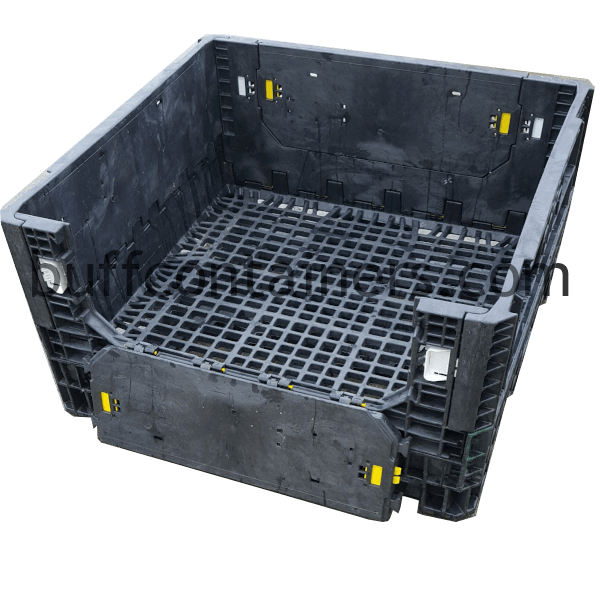Why choosing bulk plastic containers for sale is a smart business decision
Wiki Article
The Duty of Mass Plastic Containers in Effective Recycling Practices and Sustainability
Mass plastic containers are important to modern recycling efforts. Their layout improves the performance of material collection and transport, adding to sustainability goals. These containers not only optimize space but also help in monitoring contamination levels. Nonetheless, their execution is not without obstacles. Understanding the full extent of their effect reveals a complex relationship between logistics and ecological responsibility that requires additional exploration.Understanding Bulk Plastic Containers
Mass plastic containers function as an essential element in different sectors, assisting in the storage space and transport of goods. These containers are commonly made from durable products such as high-density polyethylene (HDPE) or polypropylene, which offer longevity and resistance to ecological factors. Their design often consists of functions like stackability and modularity, enabling efficient usage of area during both storage space and transportation.Industries such as farming, food processing, and producing often make use of bulk plastic containers as a result of their lightweight nature and simplicity of handling. The containers can be found in different dimensions and configurations, satisfying the specific requirements of different products. Their adaptability extends beyond simple performance; they can likewise be personalized with covers, handles, and identifying choices to enhance use - plastic bulk containers. As a result, mass plastic containers play an essential duty in maximizing logistics and supply chain operations throughout numerous industries, therefore contributing to overall effectiveness and cost-effectiveness
Benefits of Utilizing Mass Plastic Containers in Recycling
The application of mass plastic containers substantially boosts the efficiency of the procedure when organizations focus on reusing initiatives. These containers are created to optimize area, enabling the storage space and transport of bigger amounts of recyclable products. This results in less journeys to reusing centers, thus decreasing fuel consumption and connected emissions.Furthermore, mass plastic containers are resilient and resistant to different ecological variables, guaranteeing that products continue to be protected throughout handling and transportation. Their light-weight layout better adds to lower transport prices.
The uniformity of these containers helps with better sorting and processing of recyclable materials, which can enhance total recycling rates. Organizations that take on bulk plastic containers additionally demonstrate a dedication to sustainability, favorably affecting their brand name picture. Inevitably, these advantages not just simplify reusing methods yet additionally contribute to wider environmental goals
Just How Bulk Plastic Containers Facilitate Product Collection
Efficient material collection is greatly enhanced by the use of bulk plastic containers, as they provide a structured and effective option for gathering recyclable items. These containers are designed to suit huge quantities of products, which simplifies the sorting and storage process. Their stackable design makes the most of room utilization, making it less complicated for centers to organize recyclables without clutter.On top of that, bulk plastic containers are weather-resistant and long lasting, enabling exterior positioning without destruction. This durability assures that products remain protected until they are collected for handling.

The uniformity in shapes and size of these containers assists in standardization across collection points, allowing better monitoring of recyclable volumes. Their transparent nature allows for simple presence of materials, assisting in the tracking of contamination levels and assuring that only proper materials are gathered. Generally, mass plastic containers play an essential duty in improving the material collection process, thereby advertising effective recycling methods.
Transport Effectiveness and Environmental Effect
Transportation effectiveness plays an important duty in the reusing process, specifically via the optimization of lots capability wholesale plastic containers. By taking full advantage of the quantity of material transported, companies can considerably reduce the variety of journeys needed, thereby decreasing their carbon impact. This technique not just boosts functional effectiveness but additionally contributes to a lot more sustainable environmental techniques.
Maximizing Tons Capacity
Enhancing lots ability is often overlooked, it plays an important duty in boosting transportation efficiency and decreasing environmental impact in recycling practices. By making the most of the quantity that mass plastic containers can hold, recycling operations can lower the number of journeys needed for transport. This not only reduces gas usage however additionally lowers the deterioration on cars. Effective tons monitoring allows facilities to utilize area efficiently, making sure that each transport cycle is as productive as possible. In addition, well-optimized loads can result in far better settlements with logistics suppliers, possibly decreasing overall expenses. Ultimately, enhancing load capacity contributes to an extra lasting reusing system by cultivating effective resource usage and decreasing waste generated during transportation.Minimizing Carbon Impact
As reusing procedures undertaking to reduce their ecological influence, decreasing the carbon impact connected with transport becomes an essential goal. Mass plastic containers play a crucial duty in accomplishing this aim by boosting load effectiveness and maximizing logistics. Their light-weight yet long lasting layout permits for maximum freight room utilization, minimizing the variety of trips needed to transfer products. By consolidating shipments, recycling facilities can reduce fuel consumption and greenhouse gas exhausts. On top of that, purposefully find more information locating recycling centers lessens transportation distances, furthermore reducing carbon results. Moreover, using fuel-efficient lorries and different energy sources improves general sustainability. By integrating these techniques, the recycling industry can substantially diminish its carbon footprint, adding to a much more lasting future.Obstacles in the Usage of Bulk Plastic Containers

Contamination Problems
Contamination problems represent a considerable difficulty in the effective usage of bulk plastic containers within recycling practices. These containers often accumulate residues from previous contents, bring about mixed materials that can prevent the recycling process. Pollutants such as food waste, chemicals, or non-recyclable materials can endanger the honesty of the whole set, resulting in raised disposal prices and decreased reusing rates. Furthermore, inappropriate cleaning or sorting can aggravate these issues, making it difficult for reusing centers to process products efficiently. The presence of contaminants not only affects the high quality of recycled products but likewise undermines the total sustainability efforts focused on reducing plastic waste. Attending to these contamination difficulties is essential for boosting the efficiency of mass plastic container recycling.Recycling Framework Limitations
Inadequacy in recycling facilities positions substantial obstacles for the reliable administration of mass plastic containers. Many reusing facilities lack the capability to process huge volumes of these containers efficiently, leading to increased costs and hold-ups. Inadequate arranging innovations commonly lead to contamination, as mass containers may be mixed with various other products, making complex the reusing process. Restricted transport options likewise hinder the activity of mass plastic containers to ideal recycling facilities, bring about boosted landfill waste. Furthermore, a lack of standardized protocols for mass container reusing produces confusion amongst services and customers, even more complicating efforts to advertise sustainability. Dealing with these framework restrictions is vital to boost reusing methods and make the most of the potential of mass plastic containers in a round economic situation.Best Practices for Executing Bulk Plastic Containers
They need to prioritize a tactical technique that enhances performance and minimizes contamination threats when companies consider executing bulk plastic containers in their reusing practices. First, picking the appropriate container size and type is crucial to suit the quantity of materials being refined. Organizations must additionally develop clear labeling and signs to lead users on correct disposal techniques, lessening confusion and errors. Routine training sessions for team can even more enhance these methods, guaranteeing everyone recognizes their duties in keeping recycling integrity.
In addition, companies should implement a regular maintenance timetable to evaluate and tidy containers, avoiding the build-up of impurities. Partnering with regional recycling centers can likewise improve the collection procedure, making certain that materials are effectively refined. Organizations should monitor and evaluate their reusing metrics, using this data to improve methods over time and advertise constant improvement in their sustainability initiatives.
The Future of Bulk Plastic Containers in Lasting Practices
As companies increasingly focus on sustainability, the role of bulk plastic containers in reusing techniques is established to advance considerably. Technologies in products scientific research are bring about the development of recyclable and biodegradable options, enhancing the ecological benefits of bulk plastic containers. Furthermore, the execution of closed-loop systems will certainly permit for easier collection and repurposing of these containers, lowering waste and resource intake.Technological advancements, such as smart monitoring systems, will enable firms to check the lifecycle of mass containers, boosting efficiency in reusing procedures. As customer demand for lasting methods expands, organizations will likely embrace bulk plastic containers designed for reuse and long-lasting worth. Additionally, collaboration in between governments and sectors will cultivate the facility of standardized recycling protocols, making certain that mass containers are efficiently incorporated right into more comprehensive sustainability initiatives. Overall, the future of bulk plastic containers shows up encouraging, with considerable potential for adding to a round economic climate.
Regularly Asked Questions
Exactly How Are Mass Plastic Containers Made and What Products Are Utilized?
Mass plastic containers are normally made from high-density polyethylene (HDPE) or polypropylene (PP) These materials are processed through injection molding or strike molding methods, leading to long lasting, light-weight containers appropriate for various storage space and transportation demands.
Can Mass Plastic Containers Be Recycled Several Times Prior To Recycling?
home Yes, bulk plastic containers can be recycled numerous times before recycling. Their resilience and style permit for duplicated usage in various applications, advertising sustainability and source effectiveness while decreasing the requirement for brand-new containers.
What Accreditations Exist for Mass Plastic Containers in Recycling?
Different accreditations for mass plastic containers consist of the Recycling Partnership's certification, the Cradle to Cradle Licensed ™ criterion, and the Lasting Product packaging Union's guidelines, guaranteeing containers fulfill specific ecological and recyclability requirements for effective recycling.Just How Do Mass Plastic Containers Contrast to Other Recycling Storage Options?
Mass plastic containers provide higher toughness and capacity contrasted to various other recycling visit this page storage space alternatives, decreasing the risk of contamination and assisting in effective transportation. Their design sustains much better company, improving overall effectiveness in reusing operations.What Is the Life expectancy of a Mass Plastic Container in Recycling Processes?
The life expectancy of a mass plastic container in reusing processes typically varies from 5 to one decade, depending on usage, material top quality, and ecological problems, permitting several cycles of usage prior to ultimate disposal or recycling.When companies focus on recycling initiatives, the usage of bulk plastic containers greatly enhances the performance of the procedure. Transportation efficiency plays a crucial duty in the recycling process, specifically with the optimization of tons ability in bulk plastic containers. The use of bulk plastic containers in reusing techniques deals with considerable obstacles, particularly worrying contamination issues and limitations within reusing infrastructure. Contamination concerns represent a considerable obstacle in the reliable use of mass plastic containers within reusing techniques. When organizations think about implementing mass plastic containers in their recycling methods, they ought to focus on a strategic technique that boosts performance and decreases contamination risks.
Report this wiki page